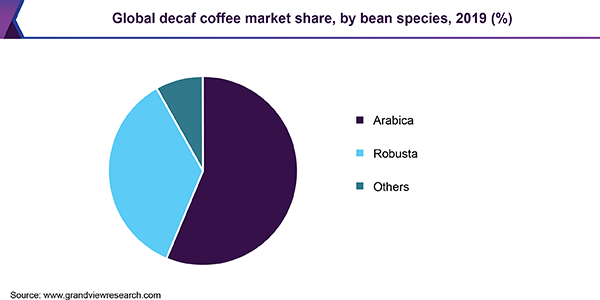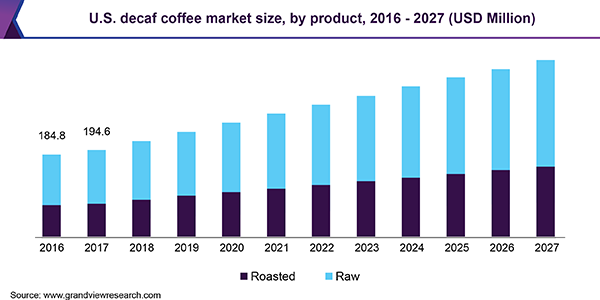The global decaffeinated coffee market size is expected to reach USD 2.8 billion by 2027, registering a CAGR of 7.0% over the forecast period, according to a new report by Grand View Research, Inc. Rising awareness about the harmful effects of caffeine on human health, such as anxiety, insomnia, digestive issues, muscle breakdown, high blood pressure, and fatigue, is expected to promote the scope of decaf coffee as healthy drinks. Additionally, shifting inclination towards functional and decaffeinated beverages among millennials at the global level as a result of increased health awareness through social media and television campaigns by hot beverage companies is expected to expand the industry scope.
Over the past few years, new product developments through synergizing the business expertise between two or three companies are expected to open new avenues. For instance, in February 2020, Starbucks and Nestlé together launched a new range of coffee capsules for the Nespresso original system. It comes in four premium signature blends and is made from ethically sourced Arabica coffee. Starbucks Decaf Espresso Roast, which is one of the four blends, has caramelly sweetness. These capsules are made from recyclable aluminum and are accepted in Nespresso’s Canadian recycling solutions.
/image%2F6144638%2F20201209%2Fob_46bf47_decaffeinated-coffee-market.png)
View exclusive Global strategic Business report
Similarly, in February 2020, The Caffeinery's began its coffee roasting program. The roaster roasts three pounds of coffee every nine minutes. The company also offers decaffeinated blend, which has been awarded several times for its year-round catalog. Likewise, in January 2020, McDonald’s through its brand, McCafe launched decaf coffee drinks with the aim of attracting local customers who are sensitive to caffeine and heavy coffee drinkers. Four such drinks are available, which include Americano, McCafe Latte, Cappuccino, and Espresso. This offers a variety of choices for customers seeking to control their daily caffeine intake.
Key decaffeinated coffee market participants include SWISS WATER DECAFFEINATED COFFEE INC.; LifeBoost Decaf; Cafe Don Pablo Colombia Supremo Decaf; No Fun Jo Decaf; and Fresh Roasted. Product innovation is expected to remain a key strategy among the industry players in the near future.
Further key findings from the report suggest:
- Raw products generated revenue of USD 1.0 billion in 2019. Growing popularity of home roaster is motivating people to opt for unroasted and raw product forms
- Roasted products are expected to expand at the fastest CAGR of 8.1% from 2020 to 2027. These product categories are expected to gain popularity among the consumers due to their enhanced flavor and excellent aroma characteristics
- Based on bean species, Arabica accounted for around 30% share of the global revenue in 2019. This is attributed to large cultivation and easy availability of these beans
- Asia Pacific decaffeinated coffee market is expected to exhibit the fastest CAGR of 8.2% from 2020 to 2027 on account of improvement in economic indicators in countries, including Indonesia, Malaysia, and India.

To understand key trends, Download Free Sample Report
According to the 2017 National Coffee Association (NCA) report, people aged between 18 to 24 years formed the largest consumer group of decaf coffee in the U.S. and made around 19% of the total consumers. The survey also highlighted that 68% of the population thought that it is necessary to reduce their caffeine intake. Additionally, 66% agreed that it is essential to cut down their coffee consumption. This trend is expected to propel the demand for decaffeinated beverages in the years to come.
Millennials have been preferring organically and sustainably grown, decaffeinated, and lightly roasted coffee beans. Considering the growing demand for decaf coffee, a substantial number of cafés, coffee houses, restaurants, and eateries have begun to include items made of the aforementioned variants on their menu. Furthermore, popularity of these cafés and coffee houses among millennials, as a part of lifestyle trend for socializing and working in these spots, is expected to boost the business-to-business sales of the decaffeinated beverages.
Raw decaf coffee accounted for more than 60% share of the global revenue in 2019. This is attributed to its low price in comparison to the roasted counterparts. Soft aroma is also a key buying criterion among the buyers while purchasing raw decaf coffee. Growing popularity of home coffee roaster among buyers is also motivating people to opt for unroasted, raw, and green decaf coffee beans.
Roasted decaf coffee is expected to expand at the fastest CAGR of 7.4% from 2020 to 2027. Rising demand for this decaffeinated variant is credited to the enhancement of aroma and flavor caused by roasting. These products are comparatively higher priced than the raw decaf coffee. The cost of roasting adds to the product as it leads to the evaporation of moisture, thus making the beans lighter and crunchier.

Europe was the largest market, accounting for more than 35% share of the global revenue in 2019. High popularity of coffee in the region, along with growing awareness among people regarding the side effects of caffeine, is promoting the sales of the product in Europe. According to the International Trade, decaffeinated variant accounts for around 8% of the total coffee consumption in Germany.
Asia Pacific is expected to register the fastest CAGR of 8.2% from 2020 to 2027. This growth is attributed to rising health consciousness among the residents of countries, including India, Indonesia, and Japan. The sale is estimated to increase during the forecast period as the market is witnessing high demand for decaffeinated beverages in Japan in the form of black tea and green tea.
Arabica decaf coffee beans accounted for a share of more than 30% in 2019. This is attributed to the large cultivation and better availability of these beans. Furthermore, the content of caffeine in the variety is naturally less in comparison to the other decaf coffee beans, making the results of content decaffeination even better. This variety is also known to have a superior finished coffee flavor, aroma, and body. It’s naturally sweet and fruity flavor owing to high lipids and sugar makes it suitable for consumption with little to no sugar.
